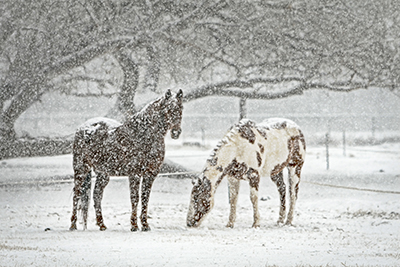Cold Weather Concerns
During winter, the change in conditions and cold weather can bring a number of problems that as horse owners, we all need to work carefully to avoid. Robert Peckham BVMedSci (Hons) BVM BVS (Hons), from Paragon Equine in Cumbria explains ...
 Colic
Colic
Certain types of colic can be more common in winter. Spasmodic/cramp type colics are the most frequent and can occur as the horse’s diet changes. Next, impaction colics are seen more frequently; this is where blockages form in the gut. Impactions can be due to a combination of factors, including a lack of water in the gut, too much long fibre/unchewed food, along with a lack of exercise. We will look at these factors in more detail below.
• Lack of water
It is important that horses have access to fresh water, with a 500kg horse drinking 25-50 litres daily depending on work load. This liquid enables food to remain soft and liquid as it moves through the gut, as well as preventing dehydration. If insufficient water is drunk, food material will firm up and eventually cause a blockage. This then causes impaction colic. Often in winter when horses are stabled, they will drink more because their food is drier compared to grass in summer.
There are two main reasons why a horse may not have consumed enough water. First the horse doesn’t have access to it and second, the horse has access but does not drink. In cold weather both piping and troughs can freeze, stopping access to water. This can be prevented by checking troughs haven’t frozen over and by lagging pipes.However some horses are fussy and will not drink from cold troughs. Automatic water troughs can make spotting this tricky as you cannot see how much a horse has drunk.If you are unsure, turn off the automatic trough and offer water by buckets, then it will be clear if the horse is drinking. It is especially important to check how much they are drinking on the first day of a cold snap, as this is often when problems arise. When it has been cold for a prolonged period they do acclimatise to it.
When horses are not drinking enough, try offering them lukewarm water several times a day. A full kettle of boiling water into a normal 15 litre bucket of cold water usually gives the right temperature. Adding a small amount of table salt to a horse’s feed can also encourage them to drink. If you have worked your horse heavily in cold weather, it is important to offer a bucket of lukewarm water after, in case they want a big drink.
• Too much long fibre
Horses should cope well on long fibre such as hay and haylage, as they thoroughly chew it into smaller pieces. However animals with dental problems may not be chewing properly, meaning longer pieces of forage get to the gut and can become ‘stuck’; these horses are hence are more prone suffering an impaction colic. It is important that all horses have their teeth checked at least annually by a vet or an EDT (equine dental technician) registered with the BAEDT (British Association of Equine Dental Technicians). If old horses with dental problems are being fed soft feed, think about making these with warm water in winter.
• Lack of Exercise
When horses are not moving their guts slow down, it is sensible to ensure that stabled horses have some form of exercise daily. This exercise stimulates the guts, and encourages defecation.
An important way to check that impaction colic isn’t developing is by monitoring a horse’s droppings. Any reduction or hardening of the droppings is a warning sign before an impaction. A vet should be called if you have concerns, and must always be contacted immediately if you see signs of colic or discomfort.
 Severe Cold
Severe Cold
Horses can cope with cold weather better than many people expect. Their natural coat is waterproof and extremely insulating. They are also hind gut fermenters, meaning bacteria in the large intestines breakdown plant fibre into digestible forms. (a horse can have 50-100 litres of food fermenting in his intestines.) The amount of heat this gives off has a considerable warming effect. This means the best way to keep your horse warm in the winter is by feeding plenty of forage and ensuring he has shelter from the worst of the wind and rain, such as a field shelter. If the cold weather persists, horses may need an increased calorie intake. Be aware that young and old horses, particularly if they are skinny, find it more difficult to keep warm and may require rugging.
One of the biggest problems we see in the cooler months is over-rugging. Usually unclipped horses don’t need a rug due to the reason above, although a light rain sheet can be useful to keep them clean. When horses are over-rugged they will sweat when it is mild/sunny during the day. This sweat is then trapped by the rug making a hot humid environment, which is perfect for bacteria to grow. This then leads to bacterial skin infections under the rugs which can be extremely painful. It is important to check horses are not sweating under their rugs, and if they do, recognise that a lighter rug is needed. In extreme cases, over-rugged horses can be so hot that they can develop colic like signs!
A slightly different problem that severe cold causes arises from frozen ground. Due to the sudden increase in concussive forces when horses exercise on frozen ground, there is a potential for issues in horses with sensitive soles or chronic laminitis.
 Mud Fever
Mud Fever
Mud fever, or pastern dermatitis, is a common skin infection of the legs. It is often caused by a mix of bacteria, which enter the skin through damage. Usually the skin has been damaged from constant contact to moisture, although minor cuts and scrapes can also provide access. The best way to prevent mud fever is by keeping the environment as dry as possible and preventing it from getting too wet. Bringing a horse in regularly to a clean, dry stable will enable muddy legs to dry and the mud to be brushed off. Be careful about hosing off muddy legs, especially if the horse has thick feathers. This is because the soaked feathers can take days to dry making the legs wetter, whereas the mud is often only in the superficial layers, which will dry quickly.
Cases of mild mud fever can be treated by stabling the horse and letting the legs dry thoroughly. If the leg is swollen, or the horse has painful scabs, this is the time to call your vet.
Rain Scald
Rain scald is also caused by a bacterial infection like mud fever, but is usually found on the back or body of horses. We often see it in horses which have got wet under a rug, either through leaks, or sweat from being over-rugged. This constant moist environment under the rug makes the conditions right for bacteria to grow, which causes rain scald. It is prevented by regularly checking under a horse’s rug to ensure they are dry and not sweaty.
Lice
External parasites can become more of a problem in winter, as horses will have longer coats, providing a nice home for them to live in. Again, rugging can exacerbate the problem. Horses with lice can be extremely itchy, along with having a dry, flaky coat. With careful examination you can see the lice moving in the coat.If you suspect your horse has lice, it is best to discuss diagnosis and treatment with your vet.
Article by Robert Peckham, BVMedSci (Hons) BVM BVS (Hons), Paragon Equine.
Tel: 01768 483789
Email: Paragon Equine, Newbiggin, Cumbria
Website: This email address is being protected from spambots. You need JavaScript enabled to view it.



